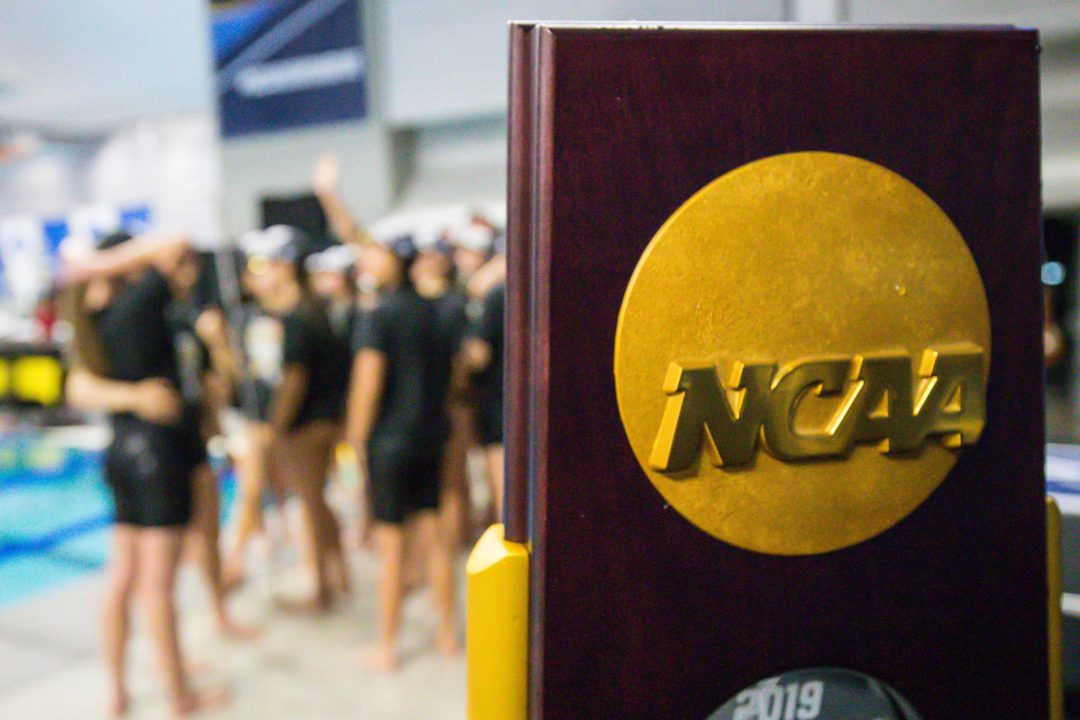The NCAA Division I Council has formally recommended moving fall Division I NCAA Championship events until the spring semester over fears about the ongoing coronavirus pandemic. This comes after a Tweet last week by NCAA president Mark Emmert where he said that there weren’t enough schools planning to participate to hold fall championships.
The NCAA says that over 50% of NCAA Division I schools had canceled fall sports seasons or postponed them until the spring.
In accordance with the NCAA Board of Governors directive, the Council recommended that fall championships should be played in the spring only if they can be conducted safely and in accordance with federal, state and local health guidelines.
The NCAA says that it continues to hope that its priority is to “preserve opportunities for winter and spring student-athletes who did not have the chance to participate in NCAA championships in 2019-2020.”
The majority of NCAA Championship events in winter and spring sports in the 2019-2020 season were canceled as the nation grappled with the oncoming coronavirus pandemic.
“We continue to be committed to providing opportunities wherever possible,” said Council chair M. Grace Calhoun, athletics director at Pennsylvania. “We know how much our student-athletes value these championship opportunities and will continue to exert maximum flexibility to sponsor them.”
The NCAA offers fall sports championships in 8 sports, including men’s water polo:
- Men’s water polo
- Men’s cross country
- Women’s cross country
- Men’s soccer
- Women’s soccer
- Women’s field hockey
- Women’s volleyball
- Football*
* – The NCAA only sponsors a championship in FCS (1-AA) football. The championship of the FBS is awarded by third parties, and the NCAA simply recognizes champions honored by those 3rd parties.
The decision comes as more-and-more conferences and schools withdraw from fall sports competition, though at least 3 Power 5 Conferences, the ACC, SEC, and Big 12, have said that they will be trying to push forward with the season.
Further, several schools that planned to have in-person education during the fall semester, have begun, and pushed to mostly-remote learning after early outbreaks on campuses.
Eligibility Extensions & Student-Athlete “Well-Being” Directives
The Council also recommended that fall sport student-athletes be granted an additional year of eligibility and an additional year in which to complete it.
Last week, the Council endorsed that student-athletes in all fall sports receive an extension to their “five-year clock” period of eligibility, and an additional season of competition if they participate in 50% or less of the maximum number of competitions allowed in each sport.
The new recommendation is even more flexible, seemingly granting an additional year of eligibility to fall sport student-athletes regardless of last week’s benchmarks.
Additionally, Council members made several recommendations that align with requests made by a group of Pac-12 football players last week, who said that they would not play unless their demands were met:
- Schools should be prohibited from requiring student-athletes to waive legal rights regarding COVID-19 as a condition of athletics participation.
- Schools should be prohibited from canceling or reducing athletics scholarships if a college athlete in any sport opts not to participate due to COVID-19.
- That student-athletes who do not enroll full time during the 2020 fall term be provided some flexibility in the progress-toward-degree requirements that must be met for eligibility in future terms.
- The financial aid of fall sport senior student-athletes who take advantage of the additional year of eligibility and extended clock should not count against team limits in 2021-22.
- Schools should be required to:
- Review current insurance coverage for all student-athletes who are competing this fall.
- Inform student-athletes about the risk classification of their sport as outlined in the Resocialization of Collegiate Sport document.
- Inform student-athletes how the mandates in the Resocialization of Collegiate Sport document are being met at their campus
Playing and practice season regulations
Courtesy: NCAA
The Council also discussed playing and practice season issues that resulted from seasons being canceled and postponed and agreed that current legislation provides flexibility for members to apply the rules that work best for most of their student-athletes. Council members did grant a waiver to allow the same flexibility for women’s volleyball, which has different rules.
The Council will seek membership feedback and further develop the potential models for spring championships before making a final decision on playing and practice season rules for fall sports in 2020-21.
The Football Oversight Committee recommended that schools that have postponed their football fall competition and plan to compete in the spring of 2021 be allowed to participate in up to 12 hours of countable athletics activities per week, with two required days off. No more than five of those hours can be skill instruction, during which footballs, helmets and spider pads can be used. No contact would be allowed, but strength and conditioning, team, position and individual meetings and film review would be allowed within the 12-hour weekly limit. A four-hour daily limit on athletics activities is included.
The Council adopted the oversight committee’s recommendations as emergency legislation for both the Football Bowl and Football Championship subdivisions. The new limits are effective Monday, Aug. 24, through Oct. 4. The committee intends to further study the issue to determine appropriate levels of countable athletics activity for the remainder of the year.
